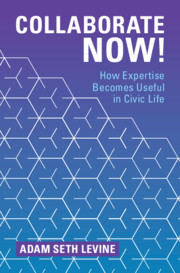Book contents
- Collaborate Now!
- Collaborate Now!
- Copyright page
- Contents
- Figures
- Tables
- Acknowledgments
- 1 Expertise and Collaborative Relationships in Civic Life
- 2 A Theory of Relationality
- 3 Relationality in Practice
- 4 The Link between Relationality and Collaborative Relationships
- 5 Surfacing and Meeting Unmet Desire for New Collaborative Relationships
- 6 Moving Forward
- Book part
- References
- Index
1 - Expertise and Collaborative Relationships in Civic Life
Published online by Cambridge University Press: 14 March 2024
- Collaborate Now!
- Collaborate Now!
- Copyright page
- Contents
- Figures
- Tables
- Acknowledgments
- 1 Expertise and Collaborative Relationships in Civic Life
- 2 A Theory of Relationality
- 3 Relationality in Practice
- 4 The Link between Relationality and Collaborative Relationships
- 5 Surfacing and Meeting Unmet Desire for New Collaborative Relationships
- 6 Moving Forward
- Book part
- References
- Index
Summary
This chapter discusses the importance of collaborative relationships in civic life, and how the relationships that people would value do not always arise on their own. Instead, there can be an unmet desire to collaborate. It underscores why it’s important to distinguish between two types of goals for collaborative relationships: informal collaboration oriented toward knowledge exchange, and formal collaboration oriented toward projects with shared ownership, decision-making authority, and accountability. It also introduces the book’s main argument, which is that in addition to commonly cited factors such as resource constraints and a lack of organizational incentives, unmet desire arises because potential collaborators (who often begin as strangers) can be uncertain how to relate to each other. Uncertainty about relationality is a key barrier to new collaborative relationships. Last, the chapter also connects a rich understanding of the science of collaboration to several other topics: the nature of democratic agency, how to strengthen the link between science and society, the nature of discursive participation as a form of civic engagement, and how we conceptualize civic competence.
Keywords
- Type
- Chapter
- Information
- Collaborate Now!How Expertise Becomes Useful in Civic Life, pp. 1 - 40Publisher: Cambridge University PressPrint publication year: 2024

